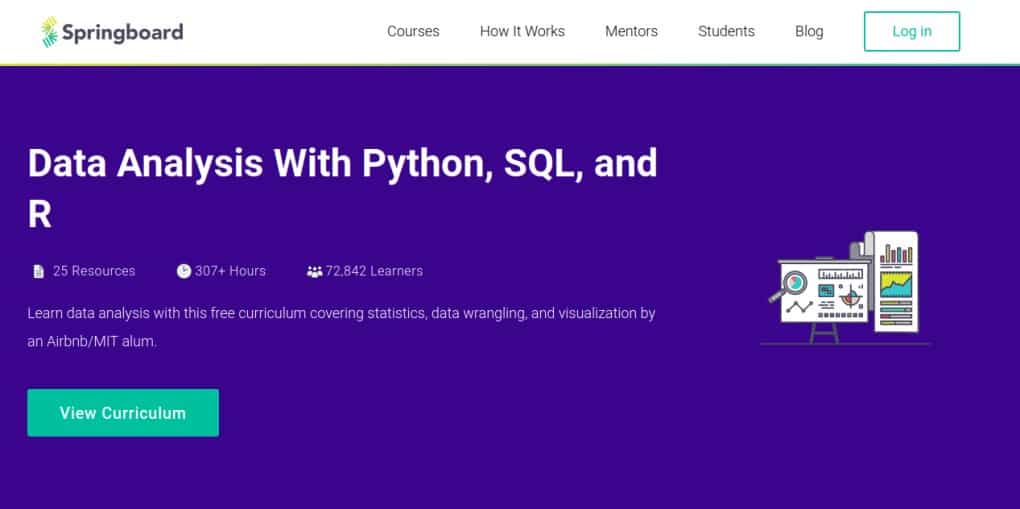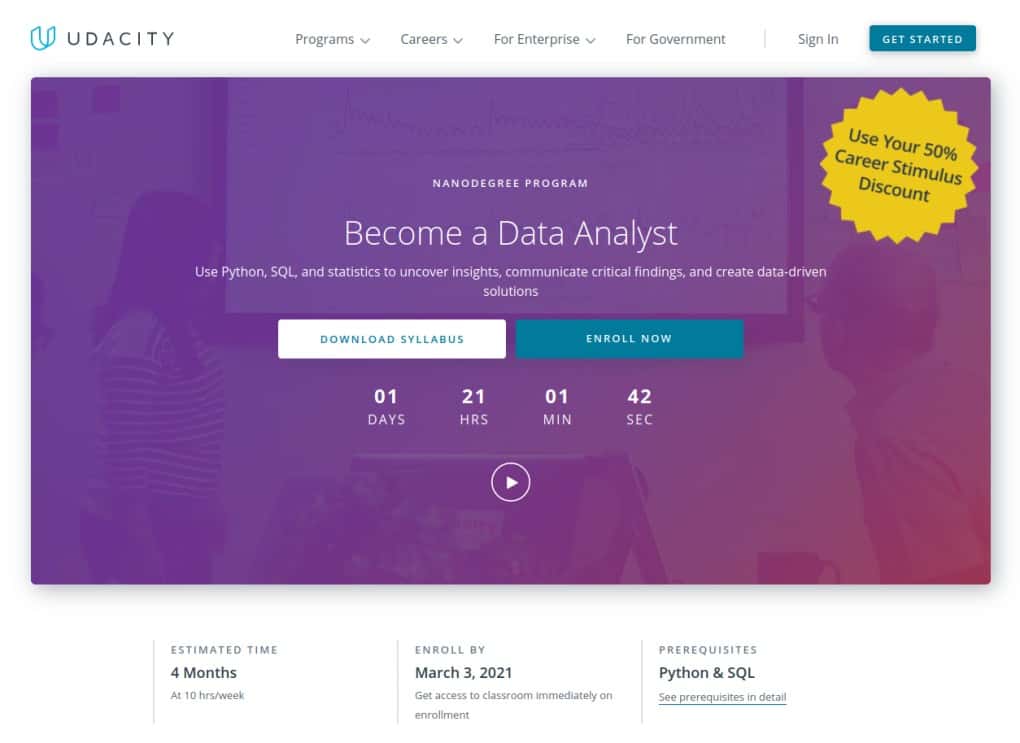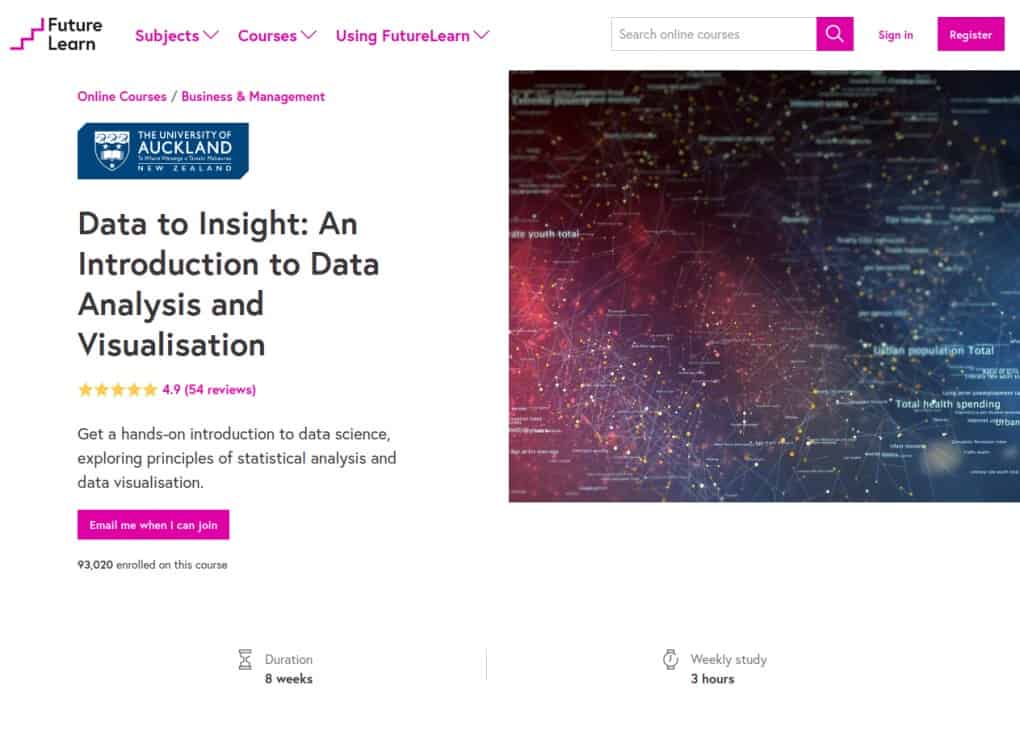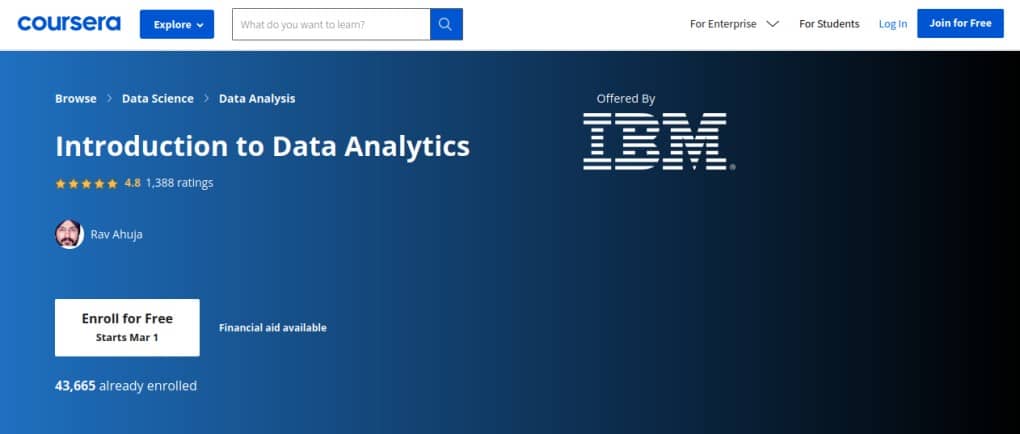
How to Learn Data Analytics
Data is everywhere on the internet. This web page is full of data. When you send an email, you create data. Some people and businesses collect data for a specific purpose and analyze their findings using data analytics. Such data can help businesses and individuals solve problems, answer questions, and improve their websites and services.
In this guide, we’re going to talk about learning data analytics. We will start by discussing what you need to know when you are learning data analytics. Then, we will chat about resources you can use to build an understanding of data analytics.
What You Need to Know About Data Analytics
Data analytics is a method of studying data sets to come to conclusions. Using data to solve problems means businesses and individuals can take an evidence-based approach to their tasks, rather than just guessing the solution to a problem.
To become an expert at data analytics, there are a few things you need to learn:
- The Fundamentals. Before you start analyzing data, you need to know the fundamentals about this field. What is data analytics? Who uses data analytics? What are the main techniques used to analyze data? These are all essential questions you should be able to answer.
- Learn SQL. SQL is a programming language used for storing and working with data in databases. You should learn how to write your own SQL statements.
- Learn Excel. While you may think of data analysis as a field where you spend most of your time coding, your real job is to draw conclusions from data. To do this, you should use the best tool for each job, which does not always mean coding. You will need to have a good understanding of how to use a spreadsheet tool like Excel.
- Learn a Data Science Programming Language. R and Python are popular choices for people learning data science. These languages are incredibly powerful and give you access to the statistical tools you will need to analyze datasets. Julia is another choice for a data science programming language you could learn.
- Refine Your Understanding of Techniques. As you learn a data science programming language, you should build connections between the theory of data science and the programming language you are using. How do you scrape data? How do you clean data? How do you ensure your data is prepared for a report? These are all questions you must answer to be a good data scientist.
The above list is only a starting point. You will find yourself delving into mathematics, programming languages, and data theory as you learn data science. There is no linear path that tells you exactly what skills you need to know, nor how to build intuition that will help you analyze data sets. You need to rely on the golden rule: practice.
Skills Needed to Learn Data Analytics
To learn data analytics, you should feel comfortable working with numbers. Indeed, most of the data sets you will use will involve working with numbers. Even if you work with data that does not include numbers, the programming language you use will probably incorporate numbers in some way. You cannot escape numbers in data analytics.
Data analytics is all about solving problems through data. You must feel comfortable thinking through the ways in which you could solve a problem. You must also be able to figure out how to evaluate different courses of action to choose a good solution to a problem.
Why You Should Learn Data Analytics
As the internet has become more popular and advanced, so too have jobs in data growth. Most big technology companies now have data analysts who can derive insights from the data the business has collected. This is a big reason to learn data analytics: you will have no trouble finding a company who can use your skills.
Data analytics will help you become a more logical thinker, too. As you build experience analyzing datasets, you will build an intuition about what works and what does not work when you are analyzing data. You will be forced to think through problems step-by-step and devise logical solutions to said problems.
Salaries play a big part, too. Check out our “Will learning data analytics help me find a job?” section to learn more about data analytics and your career prospects.
How Long Does It Take to Learn Data Analytics?
Expect to spend about six months to a year developing a good understanding of data analytics, assuming you study for an hour or so per day. While you can quickly learn the basics of a specific tool, you will need a lot of practice to build a deep understanding of data analytics conventions and best practices.
In reality, your learning will never be over: new technologies are constantly being released. But after six months of studying, you should be ready to start applying your skills in a professional environment, or at least on more advanced self-study projects.
Learning Data Analytics: A Study Guide
Because data analysts are in demand, there is a growing body of resources available from which you can learn the basics of data analytics. To help you get started learning data analytics, we have prepared a list of some data analytics resources ranging from tutorial series to courses.
Data Analysis With Python, SQL, and R by Springboard

- Resource Type: Course
- Price: Free
- Audience: Beginner
This course is described as a “short but intensive” introduction to data analysis. You will start by learning about the tools you need to know to write data analytics code before learning more about data science and techniques you will need to use.
Later in the course, you will have a choice of an area in which you can specialize so you can extend your knowledge of data analysis even further. In total, Springboard estimates the course will take between 350 and 400 hours to complete. This accounts for the time it takes to review learning resources and work on assignments and projects.
Become a Data Analyst Nanodegree by Udacity

- Resource Type: Course
- Price: $399 / month
- Audience: Beginner
Developed in collaboration with Kaggle, this course covers the basics of data analytics. You will learn how to investigate a dataset, practical statistics, visualizing data, and cleaning data. Through the course, you will work on real-world projects which will help you build an understanding of the concepts you learn. You can also contact technical mentors who are available to provide support for you if and when you need help.
Kaggle Data Science Tutorials

- Resource Type: Online tutorials
- Price: Free
- Audience: Beginner and intermediate developers
The Kaggle Data Science tutorials cover the basics of a range of data science topics, from using Pandas in Python to working with databases using SQL. While some of the tutorials are more focused on data science than data analytics, you will find some useful resources on data visualization, SQL, cleaning data, and other data analytics topics.
Data to Insight: An Introduction to Data Analysis and Visualisation

- Resource Type: Course
- Price: Free
- Audience: Beginner developers
This course takes a look at basic data analysis and visualization. You will learn about the basic data science concepts you need to know, how to represent data from your analysis, and how to discuss the limitations and benefits of the data you use in your studies.
This course is designed to help you”start thinking like a data analyst,” and discusses how data analytics and analysis can be applied in business situations.
Introduction to Data Analytics by IBM on Coursera

- Resource Type: Course
- Price: Free
- Audience: Beginners
This course is an introduction to the field of data analytics and analysis. You will learn how to distinguish the key roles in the field of data and the basics of conducting a data analysis study. This involves learning how to gather data, identify data sources and then derive insights from that data. This course takes approximately 11 hours to complete in total and requires no prior experience with data analysis or computer science.
Communities for People Studying Data Analytics
There are dozens of active communities online for aspiring and existing data analytics experts. These communities are a great place to go to meet new people and discuss what you are working on or what you are learning. Below, we have composed a list of data analytics communities you may want to check out.
Kaggle
Kaggle is a great community for any data professional to join, from experts to those who are just beginning. With a range of communities in which you can engage as well as competitions in which you can compete, you are sure to find something that piques your interest. The competitions, especially, are a great way to build your skills because they ask you to solve real-world challenges.
Stack Overflow
You cannot go wrong with Stack Overflow for developer questions. In the context of data science, you will find plenty of questions and answers that relate to data analysis problems. You will also find answers to questions about the tools you may use — like Python — which will help you solve issues you encounter as you learn about data analytics.
IBM Data Science Community
The IBM Data Science community has thousands of members who are interested in data science. On this website, you will find discussion forums in which you can participate as well as IBM events you may want to join that will help you build your skills. In addition to data analytics discussions, you will find threads on statistics, and decision optimization, which may all be relevant to you as you build your data analytics skills.
How Hard is It to Learn Data Analytics?
Data analytics is not an easy field to learn about. This is because data analytics mixes knowledge of mathematics, statistics, programming, and data. With that said, it is completely possible to learn about data analytics if you devote yourself to your studies. You do not even need any programming experience to get started: all you need is an interest in mathematics and data, which will help you get on your feet as you begin learning about data analytics.
Will Learning Data Analytics Help Me Find a Job?
Data analytics is a valued field in the labor market. As a result, data analytics professionals like data analysts generally command strong salaries. Below, we have researched a few statistics to help you learn more about the career prospects for a data analytics professional.
- Salaries. At the time of writing this article, Glassdoor reports the average data analyst earns $62,453 per year. Data analyst is the title under which data analytics skills are applied.
- Job Openings. Glassdoor reports that there are 7,159 open jobs for data analysts in the United States at the time of writing this guide.
- Industry Growth. The U.S. Bureau of Labor Statistics reports that jobs in operations research analysis, where data analytics skills are applied, are expected to grow by 25% until 2029.
Conclusion: Should You Learn Data Analytics?
Data analytics is a skill for life. As businesses continue to explore the uses of data in helping them make better decisions, they are more likely to hire professionals to help them make sense of their data. Because data analytics takes time to learn and master, you can expect to be well paid in most positions you will find.
Not only will learning data analytics help you boost your career, you will also refine your logical and analytical thinking skills, which can be applied to a range of situations.
If you want to become a data professional, having a strong understanding of data analytics is essential. You may also find data analytics skills are useful for careers in software development, although to a much lesser extent than you would see for jobs in data. Whether or not you need to learn data analytics is up to you: do you want to learn data analytics? Do you find data interesting? Can you see yourself analyzing datasets every day during your work?


